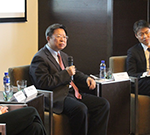European Chamber's Stance on US-China Agreement Made in Buenos Aires Go back »
2018-12-03 | All chapters
Background
On 1st December 2018, President Donald Trump and President Xi Jinping met on the sidelines of the G20 Summit in Buenos Ares to discuss the US-China trade conflict. As a result of the meeting, an agreement was made to delay any further escalation of the conflict for at least 90 days, during which the two parties would enter into negotiations.
Stance
The European Union Chamber of Commerce in China (European Chamber) welcomes the agreement made by President Xi and President Trump on the sidelines of the G-20 summit. The commitment to neither escalate current tariff rates nor levy new ones is reassuring to the many European companies in China that have been impacted by the ongoing trade conflict. The European Chamber hopes to see the coming negotiations between the US and China bear fruit so that the remaining tariffs can be unwound.
Beyond that, steps need to be taken to prevent such issues from arising again in the future. Unilaterally, China can show leadership by realising its commitments to become an open and fair market, which will also require the willingness of the US, as well as China’s other trading partners, to engage in China’s long-term structural economic reforms. However, this is also an opportune moment for the multilateral system to be modernised so that a rules-based trade and investment regime can be used to resolve any disputes in the future. As the G20 Leaders’ Joint Declaration identified the need for WTO reform, there is a clear signal that such efforts are demanded more broadly. European businesses in China share this demand and are eager to see the WTO modernised to better address its current shortcomings while also laying the groundwork to overcome the challenges on the global economic horizon.
“Today, European businesses can breathe a temporary sigh of relief.” Said Mats Harborn, president of the European Union Chamber of Commerce in China. “We hope that progress will be made and urge the members of the WTO to take this opportunity to make much-needed changes to modernise the global institution to prevent conflicts like this from recurring in the future.”
For more information please contact
Xinhe Fan
- +86 (10) 64622066 ext.35
- xhfan@europeanchamber.com.cn
